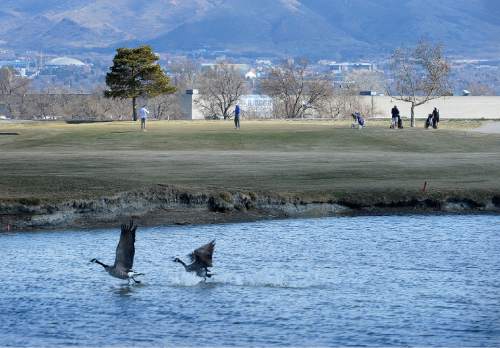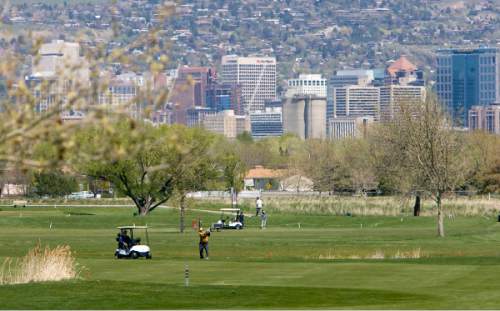This is an archived article that was published on sltrib.com in 2015, and information in the article may be outdated. It is provided only for personal research purposes and may not be reprinted.
There will not be a $150 million recreation bond on Salt Lake City's Nov. 3 ballot.
A $99.8 million general obligation bond, however, could be put to voters.
The council must decide whether to approve a bond proposal by Tuesday — the deadline set by the Salt Lake County Clerk's Office to put a measure on the ballot.
In an unusually short one-hour work session Thursday, Salt Lake City Councilwoman Erin Mendenhall proposed a recreation bond that would trim $50 million from the plan presented to the council by Mayor Ralph Becker.
In a nonbinding straw poll, the council voted 4-2 in support of the pared-down proposal.
State law, though, says a bond cannot go before voters this year with less than two-thirds support of all council members. That equates to a minimum of five votes on the seven-member council.
Absent from Thursday's work session was City Council Chairman Luke Garrott, who looks to be the swing vote.
Garrott, who was opposed to the original proposal, had a change of heart Aug. 4, when the council trimmed $50 million in recreation projects and replaced them with $50 million to catch up on unfunded needs at existing parks and trails.
"One of my misgivings [with the original proposal] was that it included a lot of new stuff, while not taking care of what we have," Garrott said in an interview at the time. "[Now] there is momentum to move forward."
Garrott could not be reached for comment Friday, leaving in question how he would vote on Mendenhall's proposal that eliminated the $50 million to cover the backlog he worried about.
Council members Charlie Luke and Lisa Adams voted against Mendenhall's revamped plan. The pair also opposed the original bond because new projects it outlined would require more than $3 million in annual maintenance costs.
Mendenhall's plan also would require about $3 million in annual upkeep.
"Our residents need to understand taxes will have to go up to cover maintenance," Luke said. "If we don't share that with voters, it's bad policy."
Luke and Adams also have said the process has been too rushed.
In the Aug. 4 meeting, Adams said the council should wait at least a year before putting the bond before voters. Many of the details in the proposal aren't spelled out, she said.
"There are great things we could do with much less money," Adams said, "if we had more time."
In an interview Friday, Mendenhall noted it was the council, not the mayor, that originally proposed putting a bond before voters. And it was the council that set up the time frame that would put the proposal on the November ballot.
"It's not reasonable to blame the shortness of the process," she said, "when we created the process."
The bond proposal originated with the council's decision in February to transform the Glendale Golf Course into a multipurpose regional park, Mendenhall said. And it was the council that directed the Becker administration to put together a recreation proposal that would serve the whole city.
"The bond is really quite broad," she said, pointing to proposed improvements to the Bonneville Shoreline Trail, the Bonneville Golf Course/Wasatch Connector trail, the proposed 9-line Trans-Valley Corridor and a new water system proposed for Nibley Golf Course.
Mendenhall's plan would reduce spending on the proposed Glendale transformation from $66 million to about $50 million. It would eliminate $17 million proposed to remake the Jordan River Par 3 course into a nature preserve. Jordan River would remain a disc golf course.
That plan would save about another $17 million by paring back numerous other projects outlined in the original proposal.
If voters were to approve her plan, it would cost the owner of an average house in Salt Lake City about $49 a year, according to city officials. The tax increase on $1 million of commercial property would be $329.
In a July poll commissioned by The Salt Lake Tribune, 48 percent of city registered voters said they opposed a recreation bond that would raise property taxes by $60 on a home valued at $250,000.
The SurveyUSA poll said 39 percent would favor such a bond. Thirteen percent were unsure. The poll of 662 registered city voters had a margin of error of plus or minus 3.9 percentage points.





